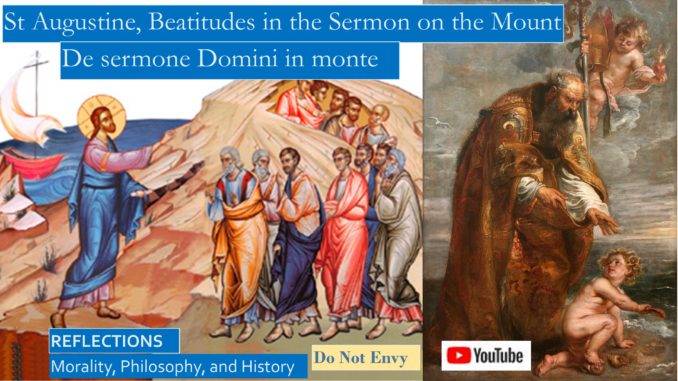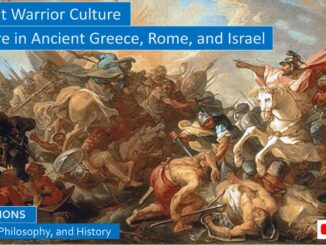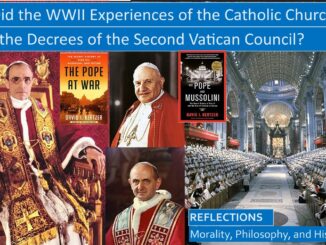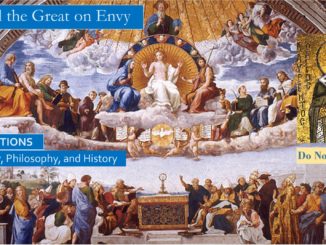
St Augustine begins his treatise on Our Lord’s Sermon on the Mount by the example in Matthew of the “perfect standard of the Christian life:”
“Everyone then who hears these words of mine and does them
will be like a wise man who built his house upon the rock;
and the rain fell, and the floods came,
and the winds blew and beat upon that house,
but it did not fall, because it had been founded on the rock.”
“And everyone who hears these words of mine and does not do them
will be like a foolish man who built his house upon the sand;
and the rain fell, and the floods came,
and the winds blew and beat against that house,
and it fell; and great was the fall of it.”[1]
St Augustine tells us the fate of those who hear God’s words and does them, and then for emphasis those who do not, hearing is not enough, the words must be planted in our soul and bear fruit in our actions and deeds.
The best eBook of Nicene and Post-Nicene Fathers, Series 1, Volume 6, can be purchased at https://www.christianbook.com/
Why did Christ climb the mountain to preach to the people? St Augustine teaches us so Christ can teach us “greater precepts of righteousness,” righteousness not solely through fear, but righteousness that will “set us free by love.”
Who are the poor in spirit in the first beatitude, “Blessed are the poor in spirit, for theirs is the kingdom of God?” St Augustine teaches us that the poor in spirit are those who “are humble and God fearing,” whose spirit is not proud, not puffed up by the wind.
This is the clause in the section of the Catechism on the commandment, Do Not Envy, that quotes from St Augustine’s Treatise on Our Lord’s Sermon on the Mount comments on this First Beatitude:
CCC 2547 “The Lord grieves over the rich, because they find their consolation in the abundance of goods.” The reference is to Luke’s Sermon on the Plain, where the plainly “poor” are blessed, rather than the “poor in spirit.”
And this is the quote from St Augustine: “Let the proud seek and love earthly kingdoms, but blessed are the poor in spirit for theirs is the Kingdom of heaven.”
And the Catechism continues: “Abandonment to the providence of the Father in heaven frees us from anxiety about tomorrow. Trust in God is a preparation for the blessedness of the poor. They shall see God.” [2]
This summarizes these verses from the Sermon on the Mount in Matthew 6:
“Therefore, I tell you, do not be anxious about your life, what you shall eat or what you shall drink, nor about your body, what you shall put on. Is not life more than food, and the body more than clothing? Look at the birds of the air: they neither sow nor reap nor gather into barns, and yet your heavenly Father feeds them. Are you not of more value than they? And which of you by being anxious can add one cubit to his span of life? And why are you anxious about clothing? Consider the lilies of the field, how they grow; they neither toil nor spin; yet I tell you, even Solomon in all his glory was not arrayed like one of these. But if God so clothes the grass of the field, which today is alive and tomorrow is thrown into the oven, will he not much more clothe you, O men of little faith? Therefore, do not be anxious, saying, ‘What shall we eat?’ or ‘What shall we drink?’ or ‘What shall we wear?’ For the Gentiles seek all these things; and your heavenly Father knows that you need them all. But seek first his kingdom and his righteousness, and all these things shall be yours as well. Therefore, do not be anxious about tomorrow, for tomorrow will be anxious for itself. Let the day’s own trouble be sufficient for the day.”[3]
We must certainly be concerned about tomorrow, we must certainly plan for tomorrow, but once we prepare, and once we pray, then we must not be anxious.
In the next beatitude we are told, “Blessed are those who mourn, for they shall be comforted.” We mourn that which we hold dear, but when “we are converted to God” we no longer embrace what we used to embrace, we no longer rejoice in what we used to rejoice, but we have a “measure of grief” where there is not “love of eternal things.” The Holy Spirit comforts us in this grief, when we “lose our temporal joy,” so we may gain joy that is eternal. Here St Augustine is likely referring to the joy we feel both here on earth and through eternity, the joy from living a godly life, the joy that cannot be denied us, no matter what sufferings and disappointments we must endure.
Who are the meek in the beatitude, “Blessed are the meek, for they shall inherit the earth?” St Augustine teaches us that the “meek are those who do not yield to acts of wickedness, and do not resist evil, but overcome evil with good. Let those who are not meek quarrel and fight for earthly and temporal things,” while the meek “by inheritance shall possess the earth from which they cannot be driven out.” As in Romans, “Do not be overcome by evil, but overcome evil with good.”[4]
Here the meek are those who turn the other cheek, who offer their coat, who return love for hate. But the need for meekness on a personal level, in our personal relationships, does not mean that we should seek justice for wrongs done to others, or to ourselves. There is always a tension between meekness and justice.
Next is the beatitude, “Blessed are those who hunger and thirst for righteousness, for they shall be satisfied.” Here St Augustine references the story of Jesus says and the Samaritan woman at the well. Jesus asks her for a drink, and she asks Jesus why He, as a Jew, would ask a Samaritan for a drink, when Jews have no dealings with Samaritans. Jesus responds that if she only knew who He was, she would ask Him for living water. “Whoever drinks of the water that I shall give him will never thirst; the water that I shall give him will become in him a spring of water welling up to eternal life.”[5] Later in this chapter the disciples bid Jesus to eat, and Jesus responds, “My food is to do the will of him who sent me, and to accomplish his work.”[6]
Next is the beatitude, “Blessed are the merciful, for they shall obtain mercy.” How we expect others to show us mercy for our faults, yet we shirk from showing mercy in judging the faults of others.
We ascending to the next beatitude, which exhorts, “Blessed are the pure in heart, for they shall see God.” St Augustine teaches that the pure in heart are “able from a good conscience of good works to contemplate the highest good, which can be discerned by the pure and tranquil intellect alone.” Here St Augustine may be borrowing the platonic conception of the contemplation of the good. Do not seek God with outward eyes, seek to see God with the eyes of the heart!
“Blessed are the peacemakers, for they shall be called sons of God.” St Augustine teaches that we must first be peacemakers in the battle in our own soul, subjecting the motions of our soul to reason, subduing our carnal lusts which we share with the wild beasts, casting out the prince of this world, curing our perversity and disorder.
We come full circle with the beatitude, “Blessed are those who are persecuted for righteousness’ sake, for theirs is the kingdom of heaven,” for both the poor in spirit and the persecuted possess the kingdom of heaven. St Augustine notices a progression in our spiritual life in the first seven Beatitudes.[7] In this progression, please note that Jerome’s Vulgate was not in use when this treatise was written, and may not have yet been written by Jerome, so in St Augustine’s faulty Latin translation meekness precedes mourning.
“The beatitudes begin with humility:”
“Blessed are the poor in spirit, for theirs is the kingdom of heaven.”
With “knowledge of the Holy Scriptures, the soul is meek in its piety:”
“Blessed are the meek, for they shall inherit the earth.”
Then the soul mourns the “loss of the highest good” when it is entangled in “carnal custom and sins:”
“Blessed are those who mourn, for they shall be comforted.”
Then the soul realizes “vehement exertion” is needed so the “mind may wrest itself away” from the worldly things in which it is entangled:
“Blessed are those who hunger and thirst for righteousness, for they shall be satisfied.”
Those who persist in this labor to live a godly life, to change their daily habits, then seek mercy:
“Blessed are the merciful, for they shall obtain mercy.”
At this higher stage, “there is a purity of heart, with a good conscience, can contemplate the highest good, which can be discerned by the pure and tranquil intellect:”
“Blessed are the pure in heart, for they shall see God.”
The seventh beatitude is “wisdom itself, the contemplation of the truth, soothing the whole man, assuming the likeness of God:”
“Blessed are the peacemakers, for they shall be called sons of God.”
And the eighth beatitude comes full circle:
“Blessed are those who are persecuted for righteousness’ sake, for theirs is the kingdom of heaven.”
The kingdom of God belongs to both the poor and spirit and the persecuted.
St Augustine summarizes this progression:
“Fear of God,” which is the “beginning of wisdom.”
“Piety second,” “Piety corresponds to meekness, for he who inquires piously honors Holy Scripture.”
“Knowledge third,” “Those who mourn discover in Scriptures what evils they are chained to.”
“Fortitude Fourth,” those who hunger and thirst after righteousness “eagerly seek joy from the truly good,” turning away from the things of this world.
“Counsel Fifth,” “Counsel corresponds to mercy,” “we forgive as we have been forgiven, and assist others as far as we are able.”
“Understanding Sixth,” “Understanding corresponds to the pure in heart.”
Wisdom Seventh,” “Wisdom corresponds to the peacemakers,” “so passion does not oppose reason,” so we may obey God.
St Augustine recalls the verse in Romans, “We rejoice in our sufferings, knowing that suffering produces endurance, and endurance produces character, and character produces hope, and hope does not disappoint us, because God’s love has been poured into our hearts through the Holy Spirit who has been given to us.”[8] St Augustine teaches us that not only should we endure persecution, but we should endure it with a tranquil spirit, but “even with exultation.”
“Blessed are you when men revile you and persecute you and utter all kinds of evil against you falsely on my account. Rejoice and be glad, for your reward is great in heaven, for so men persecuted the prophets who were before you.”
St Augustine teaches that in violent times our lives are threatened when we are persecuted, but that in more peaceful times we may be persecuted by words and lies and by attempts to ruin our reputation, but our reward is great in heaven, “where dwells everlasting righteousness,” where the mortal becomes immortal, the heaven where we “will be perfected in every part.”[9]
The Catechism, when it references the works by St Augustine and St Gregory of Nyssa on the Beatitudes, ties the “Blessed are the Poor” Beatitude in Luke to the Commandment, Do Not Envy, as giving alms to the poor weakens your attachment to your wealth, and weakens the hold the sin of envy has on you.
Rather than eight Beatitudes, Luke’s version has four beatitudes and four woes:
Luke’s Sermon on the Plains,
With the four blessings:
“Blessed are you poor, for yours is the kingdom of God.
“Blessed are you that hunger now, for you shall be satisfied.
“Blessed are you that weep now, for you shall laugh.
“Blessed are you when men hate you, and when they exclude you and revile you, and cast out your name as evil, on account of the Son of man! Rejoice in that day, and leap for joy, for behold, your reward is great in heaven; for so their fathers did to the prophets.
And the four woes:
“But woe to you that are rich, for you have received your consolation.
“Woe to you that are full now, for you shall hunger.
“Woe to you that laugh now, for you shall mourn and weep.
“Woe to you, when all men speak well of you, for so their fathers did to the false prophets.”[10]
The first three Beatitudes and woes refer to the poor, for the poor are often hungry and miserable, and if the rich are selfish with their wealth, they will suffer woes that are the opposite of the blessings of the poor.
Since this is a sermon on the entire Sermon on the Mount, St Augustine is uncharacteristically brief in his preaching on the Beatitudes, in future blogs and videos we will explore the remaining chapters of this sermon.
We shall conclude with the Catholic Catechism’s reference to St Augustine’s Sermon on the Mount with this clause from the section on Life In Christ, The New Law, or the Law of the Gospel:
CCC 1966 “The New Law is the grace of the Holy Spirit given to the faithful through faith in Christ. It works through charity; it uses the Sermon on the Mount to teach us what must be done and makes use of the sacraments to give us the grace to do it:”
And this is the quotation from the opening of St Augustine’s Treatise on the Sermon on the Mount:
“If anyone should meditate with devotion and perspicacity on the sermon our Lord gave on the mount, as we read in the Gospel of Saint Matthew, he will doubtless find there . . . the perfect way of the Christian life…. This sermon contains … all the precepts needed to shape one’s life.”[11]
[1] https://www.biblegateway.com/passage/?search=matthew+7%3A24-27&version=RSVCE
[2] Catholic Catechism, Section 2547, http://ccc.usccb.org/flipbooks/catechism/index.html#608
[3] https://www.biblegateway.com/passage/?search=matthew+6%3A25-34&version=RSVCE
[4] https://www.biblegateway.com/passage/?search=romans+12%3A21&version=RSVCE
[5] https://www.biblegateway.com/passage/?search=john+4%3A7-14&version=RSVCE
[6] https://www.biblegateway.com/passage/?search=john+4%3A31-34&version=RSVCE
[7] https://www.biblegateway.com/passage/?search=matthew+5%3A3-9&version=RSVCE
[8] https://www.biblegateway.com/passage/?search=romans+5%3A3-5&version=RSVCE
[9] St Augustine, “Our Lord’s Sermon On The Mount,” In the Nicene and Post-Nicene Fathers, First Series, Volume 6, translated by Rev CL Cornish (Boston: Hendrickson Publishers, 1994, first published 1887), pp. 3-8.
[10] https://www.biblegateway.com/passage/?search=luke+6%3A20-26&version=RSVCE




Be the first to comment